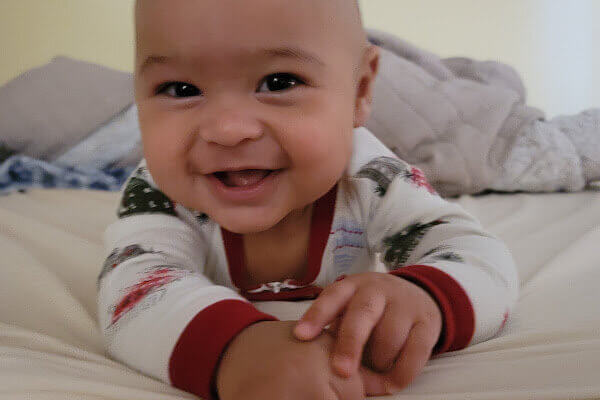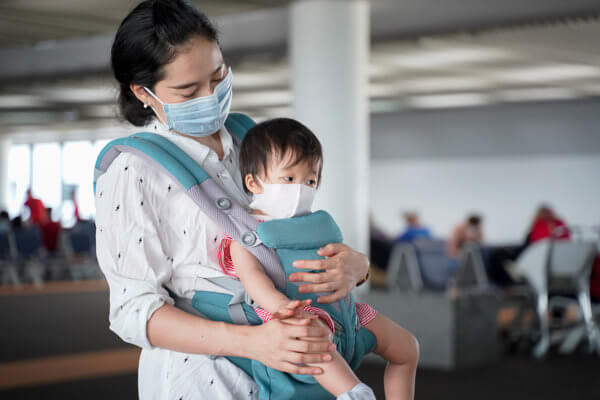Welcome to the brave new world of motherhood! To help you navigate this uncharted domain, we asked doctors from around the country to share their most important tips for newborns. By following their practical suggestions, you’ll ensure the safety, happiness, comfort, and welfare of your child—not just today, but for many years to come!
Doctors share their advice for how to keep your baby healthy (and happy).
1. Try to breastfeed
Breast milk is the only food perfectly designed for human babies. “It meets all of your infant’s nutritional needs and provides immune components that compensate for baby’s deficiencies, which is particularly important prior to receiving vaccinations,” asserts Laura E. Wilwerding, M.D., FAAP, a clinical associate professor of pediatrics at the University of Nebraska Medical Center in Omaha and the breastfeeding coordinator for the Nebraska chapter of the American Academy of Pediatrics.
If breastfeeding isn’t a possibility for you, rest assured that formula can provide adequate nutrition. “It’s important that babies get an appropriate mix of calories, minerals, and vitamins,” says Charles Shubin, M.D., director of Children’s Health Center at Mercy Family Care at the Mercy Medical Center in Baltimore, Maryland. “With formula— and I was raised on it—what we’ve done as best we can is to make it equivalent to human milk.” The bottom line: If your baby is growing and acting happy and satisfied, her diet is most likely sufficient.
2. Establish a healthy sleep routine
Let your baby set her own sleep routine, and be consistent with her sleep times. “This will teach her to sleep when she is tired and start a pattern she’s likely to continue,” advises Andrea McCoy, M.D., medical director of Temple Pediatric Care at Temple University Children’s Medical Center.
In the United States, sudden infant death syndrome (SIDS) is still responsible for more deaths beyond the newborn period than any other cause. Heed these newly revised American Academy of Pediatrics sleep guidelines to prevent SIDS:
- Babies should sleep in a crib (or bassinet) near or in their parents’ bedroom. Bed-sharing increases suffocation risk.
- Place infants on their backs to sleep. No side sleeping: Babies tend to roll from sides to tummies.
- Infants should sleep on a firm baby crib mattress (covered by a sheet) without cushy bedding (pillows, quilts, etc.) in a room that isn’t too hot.
- Encourage tummy time when healthy baby your baby is awake to prevent flat head syndrome from being on her back too much. Create a Safe Household Infants need a safe environment to thrive.
3. Always avoid tobacco smoke
“Babies exposed to secondhand smoke have more colds and are at increased risk for developing allergies and asthma,” says Johanna S. Limsenben, M.D., FAAP, a pediatric specialist at the Baylor Medical Center in Garland, Texas.
4. Move unsafe objects out of reach
“It scares me how dangerous their hands become,” says Shubin. Do not allow your baby to grab earrings, necklaces, toys, or anything they can put into their mouths and swallow.
5. Get the lead out
In the U.S., the source of most lead poisonings in children is from deteriorating lead paint in houses built before the mid-1970s. Exposure to lead—via breathing paint dust or swallowing paint chips—can lead to cognitive impairment and learning/behavioral problems. If you’re unsure, ask your county health department for a lead-hazard inspection.
6. Practice good hygiene
“This means frequent hand-washing for family members and visitors prior to handling the baby,” instructs Limsenben. “This will reduce the transmission of viruses and bacteria.”
7. Babyproof your home
Your baby will be mobile before you know it, so it’s wise to prepare now. Jay Berkelhamer, M.D., senior vice president of medical affairs at Children’s Healthcare of Atlanta, offers the following checklist to keep your home danger-free:
- Cover electrical cords and outlets
- Keep cleaners, chemicals, and medicines locked up
- Remove furniture with sharp edges
- Put latches on cabinets
- Position gates in front of staircases.
8. Hold baby as much as possible
Don’t worry, you can’t spoil your child in the first few months. “Babies need the security of knowing you’re there for them,” says McCoy. Holding your child will reassure her that you’ll respond to her needs. “At around 4 months, though, I encourage parents to let their children find ways to comfort themselves,” she adds. Babies console themselves by putting their hands in their mouths, reaching for toys, or rolling over. “They don’t need 100 percent of your attention,” McCoy concludes.
9. Read, talk, and sing
“Babies begin to understand the concept of language even as they hear it in the womb,” states McCoy. “That’s why it is important to talk, read, or sing to your baby—even if you don’t have a great voice!” Babies start to coo in the first 6 to 8 weeks; at 3 to 4 months, they can make responsive coos and squeals; and at 6 months, babbling begins. So chatter away, but know that the television may not be a good substitute. “Leave the TV off,” cautions Naomi D. Neufeld, M.D., a clinical professor of pediatrics at the UCLA School of Medicine and a pediatric endocrinologist in Los Angeles. “There’s evidence that infants’ exposure to TV may contribute to [being] easily distracted later on.”
10. Get your baby immunized
“We’re spoiled in this country because we don’t see diseases like measles, polio, or tetanus,” says Shubin, who believes that your baby should receive all the shots recommended by the American Academy of Pediatrics. In the U.S., vaccine-preventable diseases are rare, but the viruses and bacteria that cause them still exist.
11. Partner with your pediatrician
“If you have a provider you trust and relate well to, it will be much easier to bring up issues early and often,” maintains Wilwerding. “Pediatricians should be good resources for every aspect of a child’s health and development, without judging parents for their decisions.”
For example, if you’re skeptical about vaccines, you’ll want a doctor who’s willing to discuss pros and cons with you, not one who dismisses your concerns. You also need to feel free to call with questions about routine matters like teething, sleep patterns, bowel movements, childcare, feedings, travel, and the like. Well-baby visits—which are usually scheduled at two weeks after birth and three additional times during the first year—are an excellent opportunity for you to develop a rapport with your pediatrician. “When choosing a pediatrician, parents should look for these attributes,” says Berkelhamer:
- Listens well
- Encourages questions and is knowledgeable when responding
- Obtains appropriate medical history
- Conducts a careful physical exam
- Shows evident concern for your child’s development and safety »Has a backup when he/she is unavailable




